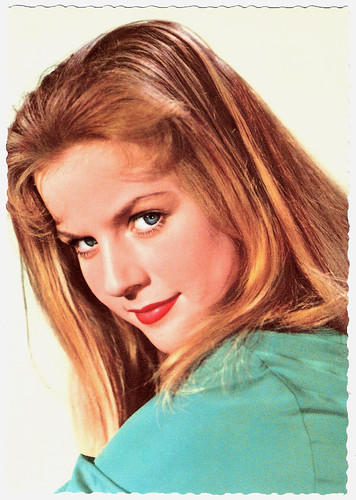
German postcard by Ufa (Universum-Film Aktiengesellschaft, Berlin-Templehof), no. CK-128. Photo: Ringpress / Vogelmann.
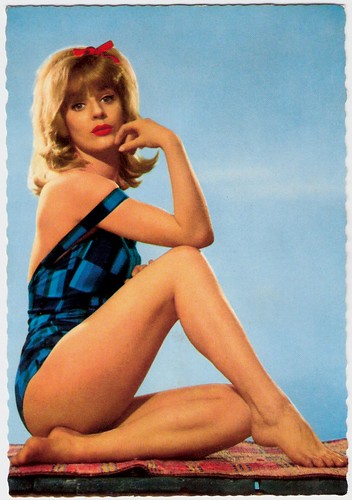
Dutch postcard by P. Moorlag, Heerlen, Sort. 10/6.
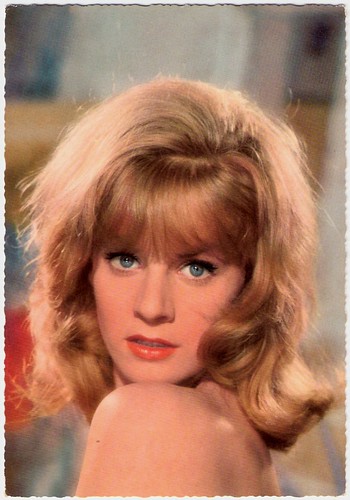
German postcard by Krüger, no. 902/30. Photo: Philips.
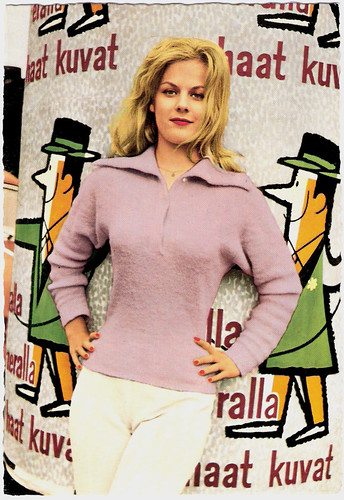
German postcard by WS-Druck, Wanne-Eickel, no. F 154.
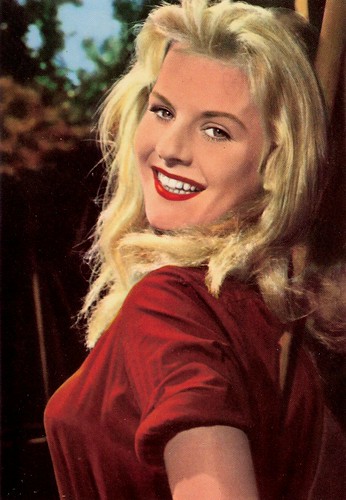
Vintage postcard.
Teen idol
Heidi Rosemarie Brühl was born in Gräfeling near München (Munich), Germany in 1942. After the divorce of her parents, she grew up with her grandparents.
She made her first film when she was only 12. Director Harald Braun had discovered her in a ballet class and cast her for an uncredited bit part in Der letzte Sommer/The Last Summer (Harald Braun, 1954) starring heartthrob Hardy Krüger.
This was followed by a small part in the Heimat film Heideschulmeister Uwe Karsten/Eternal Love (Hans Deppe, 1954) featuring Claus Holm. A string of these silly romantic rural films made her a teen idol.
Her most popular films were a trilogy based on novels by children's writer Ursula Bruns about the pony farm Immenhof: Die Mädels vom Immenhof/The Girls of Immenhof (Wolfgang Schleif, 1955) with Angelika Meissner and Christiane König as her orphaned sisters, Hochzeit auf Immenhof/Marriage at Immenhof (Volker von Collande, 1956) and Ferien auf Immenhof/Holiday at Immenhof (Hermann Leitner, 1958).
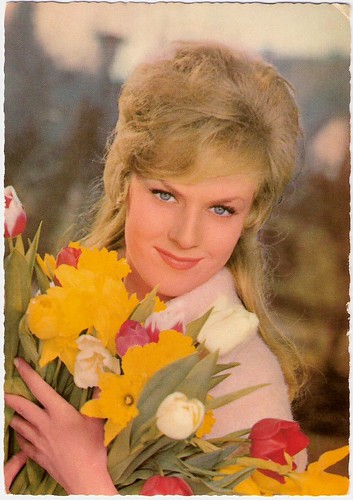
Dutch postcard, no. 14.
German postcard by ISV, no. H 93.
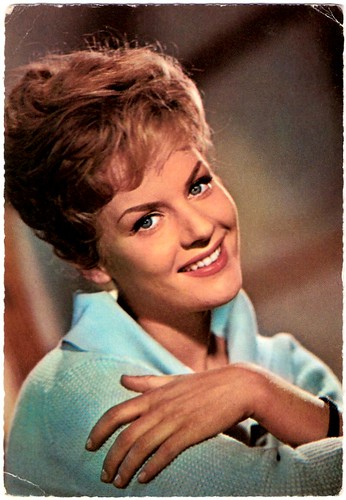
German postcard by ISV, no. H 76, circa 1964.
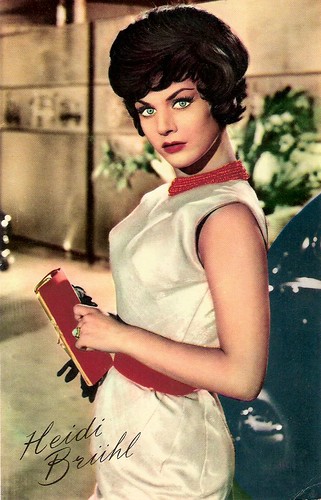
Dutch postcard.
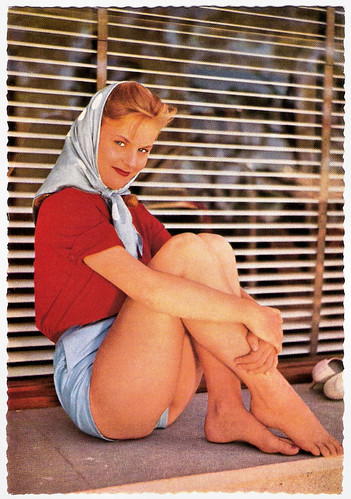
German postcard by Terra-Color, no. F 123.
Cute boys
Heidi Brühl also appeared in the excellent Thomas Mann adaptation Die Bekenntnisse des Hochstaplers Felix Krull/Confessions of Felix Krull (Kurt Hoffmann, 1957) with another German teen idol of the 1950s, Horst Buchholz.
That year, she also starred in Die Frühreifen/The Premature (Josef von Baky, 1957) with another cute boy Christian Wolff.
She also appeared opposite Wolff in Verbrechen nach Schulschluss/The Young Go Wild (Alfred Vohrer, 1959)
Heidi Brühl then could be seen as a singer in the Schlager-film Schlager-Raketen/Hit-Rockets (Erik Ode, 1960).
She also starred in Freddy und die Melodie der Nacht/Freddy and the Melody of the Night (Wolfgang Schleif, 1960) featuring schlager star Freddy Quinn, and the operetta film Der Zigeuner Baron/The Gypsy Baron (Kurt Wilhelm, 1962) opposite Carlos Thompson.
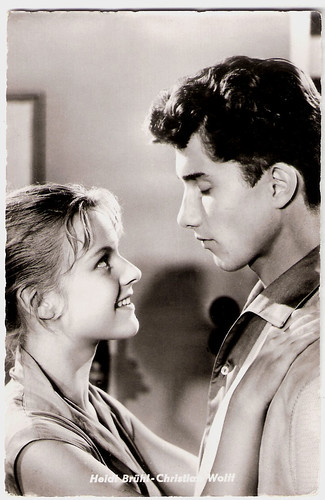
German postcard by Kolibri-Verlag G.m.b.H., Minden/Westf., no. 361. Photo: CCC / Krau. Publicity still for Die Frühreifen/The premature (Josef von Báky, 1957) with Christian Wolff.
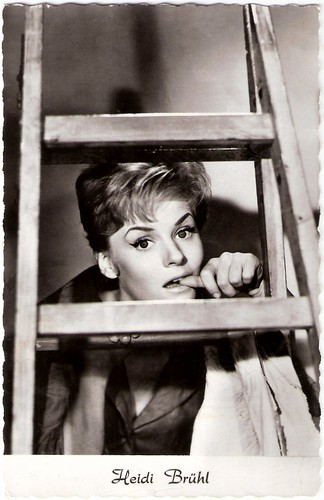
Dutch postcard by Gofilex film, no. 376. Still from Immer will ich dir gehören/Always I will be yours (Arno Assmann, 1960).
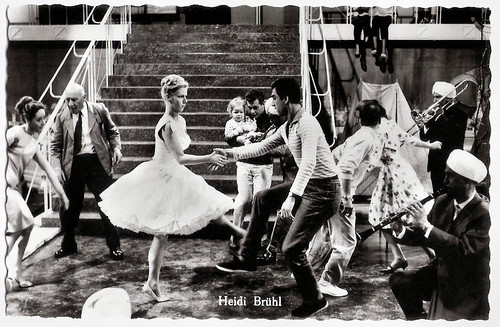
Dutch postcard by N.V. v.h. Weenenk & Snel, Baarn, no. 761. Photo: Gofilex. Publicity still for Immer will ich dich gehören/Always I will be yours (Arno Assmann, 1960) with Peter Weck.
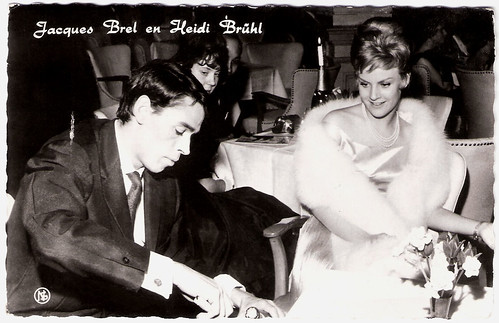
Dutch postcard by NS, no. 12. With Jacques Brel.
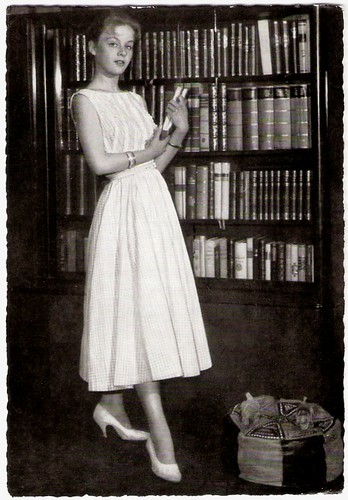
German postcard by WS-Druck, Wanne-Eickel, no. 199. Photo: Ringpress / Vogelmann / NDF.
A cool blonde
At the age of 16, Heidi Brühl decided to go back to school and studied singing, dancing, acting, English and French.
In 1959 she formed a Schlager duo, the Dolly Sisters together with Corina Corten. They obtained a record deal with the Philips label, and their first record 'Chico Chico Charlie' reached the no. 5 position in the German hit parade.
In 1960 she wanted to enter the Eurovision Song Contest solo with 'Wir wollen niemals auseinandergehn' (We will never part), but she finished in second place. The song became her biggest hit though. It reached no. 1 in the German single charts, stayed there for nine weeks and sold more than a million copies. The song was a cover of Doris Day's 'Ring of Gold', and she was nicknamed the 'Doris Day of Germany'.
She participated again at the German pre-selection in 1963, and this time she was successful and joined the Eurovision Song Contest in London. She became 9th with the song 'Marcel'.
Till 1967 she had 12 hits in Germany. She did not make films in Germany during this period, but she appeared on stage in musicals like 'Annie Get Your Gun' (1964) and 'My Fair Lady' (1969). That year she also published the memoir 'Eine kühle Blonde bitte. Erinnerungen eines bisweilen unvorsichtigen Mädchens' (A cool blonde, please. Recollections of a sometimes careless girl) (1969).
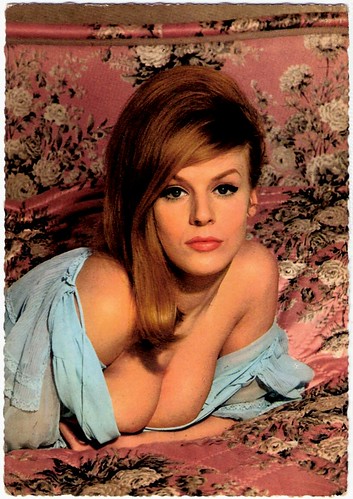
German postcard by Kruger, no. 903/321. This photo and those below are all made by the master of pin-up pics, Bernard of Hollywood. Click twice on the picture to see them in a bigger format.
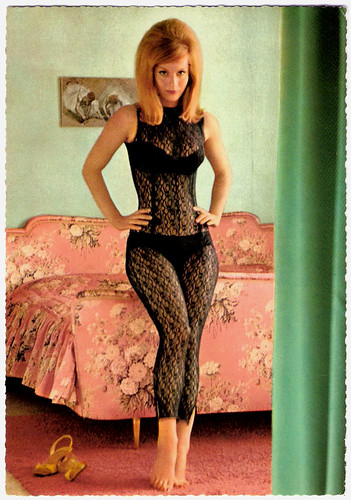
German postcard by Krüger, no. 902/322. Photo: Bernard of Hollywood.
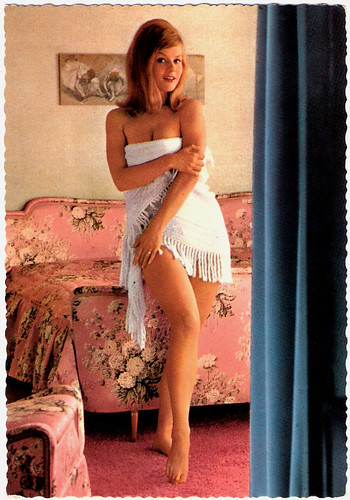
German postcard by Krüger, no. 902/319. Photo: Bernard of Hollywood.
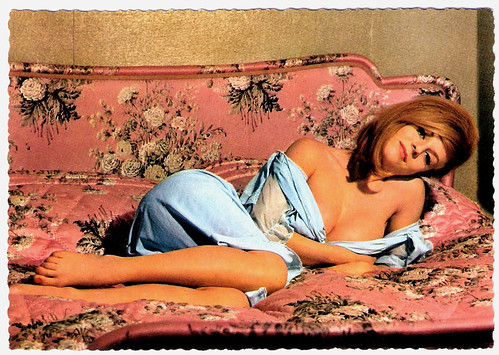
German postcard by Krüger, no. 902/323. Photo: Bernard of Hollywood.
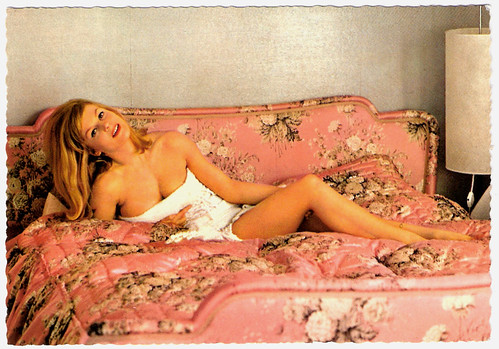
German postcard by Krüger, no. 902/330. Photo: Bernard of Hollywood.
Breast cancer
When Heidi Brühl was on a concert tour in the US she was asked to play Princess Jana opposite Guy Williams in MGM's Captain Sindbad (Byron Haskin, 1963), but the movie flopped. Brühl met American actor Brett Halsey and moved with him to Rome, where they married in December 1964. She did not make any films while she lived in Rome.
In the 1970s the family moved to the US, where she acted in the deadly dull comedy How to Seduce a Woman (Charles Martin, 1974) and appeared opposite Clint Eastwood in a small part in the adventure film The Eiger Sanction (Clint Eastwood, 1975). She also worked for TV and was a guest star in such popular crime series as Columbo (1973) starring Peter Falk, Get Christie Love! (1974-1975) starring Teresa Graves, and Marcus Welby, M.D. (1976) with James Brolin. In Las Vegas, she performed together with Sammy Davis Jr.
In between she returned to Germany to play in two further Immenhof sequels, Zwillinge vom Immenhof/Twins from Immen Farm (Wolfgang Schleif, 1973) with Horst Janson, and Frühling auf Immenhof/Spring at Immen Farm (Wolfgang Schleif, 1974) with Olga Tschechova. Both were flops.
In 1976 she divorced Halsey and returned to Germany. There she worked mainly for TV, such as in the Krimi series Der Alte/The Old Fox (1985) starring Michael Ande, and Ein Fall für zwei/A Case for Two (1984, 1987) with Claus Theo Gärtner. She also did dubbing work on films such as The NeverEnding Story and Look Who's Talking Too, and in 1982 she started a recording studio. Her final film appearance was as a civil servant in the immigration drama Kleiner Mann was tun/Little Man What To Do (Uschi Madeisky, Klaus Werner, 1981).
When she was 20, Heidi Brühl had been diagnosed with stomach cancer but had defeated the disease. In the late 1980s she got breast cancer but this time she had to surrender and refused chemotherapy. Heidi Brühl passed away in 1991 in Starnberg, Germany, only 49 years old. She had two children. Her son Clayton Halsey (1967) is an editor and actor, and her daughter Nicole Brühl-Halsey (1970) is an actress.

Dutch postcard by Gebr. Spanjersberg, Rotterdam, no. 6017. Photo: Fontana / Phonogram. Singers Ria Valk and Heidi Brühl during a promotional visit of the latter in the Netherlands.

Dutch postcard by NS, no. 62119. Heidi Brühl in Madurodam. Collection: Marlene Pilaete.

German postcard by Krüger.
Scenes from Die Mädels vom Immenhof/The Girls of Immenhof (1955) (No subtitles). Source: Kanaal van Fifteesrebel (YouTube).
TV trailer for Die Bekenntnisse des Hochstaplers Felix Krull/Confessions of Felix Krull (1957). Source: ANIXE (YouTube).
Sources: Stephanie D'heil (Steffi-line - German), Filmportal.de, Prisma (German - now defunct) Wikipedia (German) and IMDb.
This post was last updated on 18 August 2023.
No comments:
Post a Comment